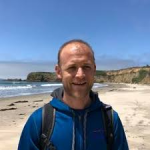SE CASC Fall 2020 Science Seminars
Join us this fall and early winter for a virtual science seminar series highlighting SE CASC funded projects that support resource management actions across the Southeast.
Refining Tipping Points for Range Expansion of Coastal Mangroves in a Warming Climate
Dr. Michael Osland, USGS Wetland and Aquatic Research Center
October 20 | 11AM ET
View a recording of this presentation.
Webinar Overview:
To improve predictions of tropical range expansion in response to climate change, there is a need to better understand tropical species’ responses to winter temperature extremes. A recent project integrated data from sites across the mangrove range edge in the Gulf of Mexico and Atlantic coasts of North America, including data from a regional collaborative network – the Mangrove Migration Network. In 2018, an extreme freeze event affected 60% of these sites, with minimum temperatures ranging from 0 to -7°C. We used temperature and vegetation data from before and after the freeze to quantify temperature thresholds for leaf damage, mortality, and biomass recovery of the black mangrove (Avicennia germinans) – the most freeze-tolerant mangrove species in North America. Collectively, our results refine temperature thresholds for black mangrove freeze damage, mortality and recovery, which can improve predictions of mangrove range expansion and coastal wetland ecological transformations in a warming climate. Learn more about this project.
Learn more about the Speaker:

Michael Osland is a Research Ecologist at the USGS Wetland and Aquatic Research Center in Lafayette, Louisiana. In broad terms, his research examines the effects of global change on ecosystems and the implications for ecological conservation and restoration. Much of his research focuses on wetland ecosystems at the dynamic interface between land and ocean (mangrove forests, salt marshes). For links to his research, please go to his google scholar profile.
Assessment of Water Availability and Streamflow Characteristics in the Southeastern U.S. for Current and Future Climatic and Landscape Conditions
Dr. Jacob LaFontaine, USGS South Atlantic Water Science Center
November 17 | 11AM ET
View a recording of this presentation.
Webinar Overview:
Information about streamflow and streamflow variability is critical to assist natural resource managers when they make decisions related to the water needs of both human communities and ecosystems. In order for managers to effectively plan for and adapt to future climate and land cover conditions, they require information on changes that could occur in the distribution and quantity of water resources. Yet every watershed has a unique set of characteristics – such as differing topographies and geology – that affect how much water is available, the sources of water, and how it flows through the system. This means that water availability in every watershed can be affected differently by changes in climate and land cover. Flow can be monitored in a stream using a stream gage, which provides information about the amount and variability of surface water resources at a particular location. However, not every stream has a gage, and decisions about water resources in these ungaged watersheds still must be made. In the absence of measured streamflow information, hydrologic models can be used to provide estimates of streamflow characteristics. This project uses a modeling approach that groups watersheds that are gaged with watersheds that are not gaged to provide accurate estimates of water availability for all watersheds in the southeastern United States, under current and potential future climate and land cover conditions. Learn more about this project.
Learn more about the speaker:

Jacob LaFontaine is a Research Hydrologist in the Norcross, GA office of the U.S. Geological Survey South Atlantic Water Science Center. His research has been focused on the development of local-, regional-, and national-scale hydrologic models for interdisciplinary work to provide hydrologic information for historical and potential future conditions in response to climate, land cover, and water use. Example projects include Southeast Regional Assessment Project (SERAP), the National Water Census Model Intercomparison Study, the National Water Census Apalachicola-Chattahoochee-Flint River Basin Focus Area Study, the Gulf Coastal Plains and Ozarks Landscape Conservation Cooperative Streamflow Characterization Study, and the Water Budget Estimation and Evaluation Projecct. These hydrologic model applications were developed to assess historical and future water availability, analyze response of watersheds to changes in climate and land cover, link with groundwater modeling efforts in complex groundwater/surface-water interaction regions, link with ecological dynamics models and water temperature models, and analyze the effects of water use on watersheds. Current research focuses on characterizing the hydrologic cycle (water budget), improving understanding of hydrologic processes, and improving existing modeling capabilities at the National scale.
Developing Future Habitat Condition Scenarios for Wildlife in the Imperiled Pine Rockland Ecosystem of South Florida
Dr. Suresh Subedi, Arkansas Tech University
December 15 | 11AM ET
View a recording of this presentation.
Webinar Overview:
Approximately 90% of Pine Rockland habitat in south Florida and the Florida Keys, USA, has been lost, fragmented, or degraded because of urbanization or other anthropogenic disturbance. Furthermore, low-lying islands and coastal areas are experiencing sea-level rise and an increased frequency and intensity of high tide flooding, putting Pine Rockland habitats at increasing risk of ecological change. We evaluated changes in the extent of Pine Rockland habitat under future sea level rise and human scenarios for two endemic, at-risk species of snakes, the Rim Rock Crowned snake (Tantilla oolitica) and the Key Ringneck snake (Diadophis punctatus acrinus). We used recent and historical species records to determine their current habitat range in South Florida and estimated the extent of future habitat loss due to sea level rise and continued human development, as well as projected differences between the two species and across their habitat ranges. Our results predict that saltwater intrusion due to sea level rise as well as short-term stochastic events such as storm surge and high tides will degrade large amounts of upland Pine Rockland habitats due to saltwater intrusion. A large amount of rockland habitat (up to 47% by 2030) will be lost to development within 10 years. Therefore, immediate mitigation actions may be needed to conserve specialist species within upland habitat which are threatened by detrimental human modifications and global climate change. Learn more about this project.
Learn more about the speaker:

Dr. Suresh Subedi is an Assistant Professor of Biology in Arkansas Tech University. He is involved in research related to the effects of climate change on natural resources and wildlife management. He is mainly interested in merging modelling and field-based approaches to predict community interactions and environmental adaptation to climate change.